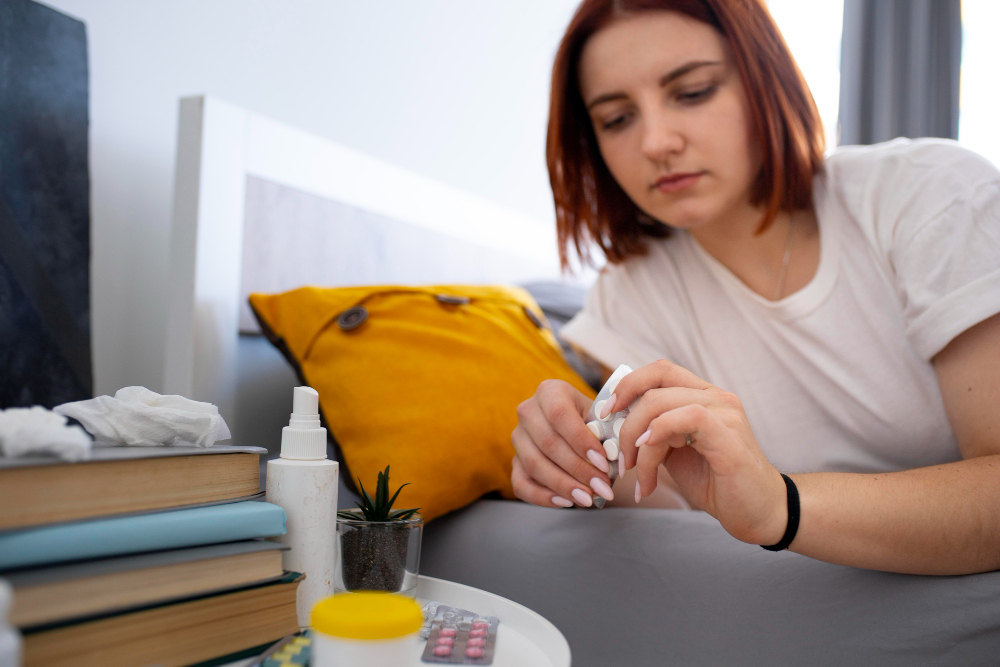Fibroids are one of the most prevalent noncancerous tumours in women, and the National Institutes of Health (NIH) estimates that almost 70 to 80 percent of women will have them by age 50. Although a vast majority of fibroids regress by themselves after menopause, symptoms like pelvic pain, bloating, or abnormal menstrual cycles bother many women.
This leads women to seek natural remedies, and herbal medicine is more and more a common choice. In this article, we will address what fibroids are, their potential causes, the manner they can act after menopause, and how herbal medicine and acupuncture can be used to treat them.
Key Takeaways
- Fibroids are non-cancerous growths that may occur in women pre- and post-menopause.
- Hormonal imbalance, heredity, and diet are some of the most common causes of fibroids.
- Herbal therapy has the potential to normalize hormones, quell inflammation, and alleviate the symptoms and signs of fibroids.
- Acupuncture is an adjunctive treatment that is helpful for circulation, stress reduction, and balancing hormones.
- Pre-visits to medical providers before starting herbal or complementary therapy are necessary in order to deliver safe care.
Fibroids: What Are They?
Fibroids, also referred to as uterine leiomyomas, are tumours that develop around and within the uterus. They consist of fibrous and muscular tissue and range from small nodules to enormous masses that cause the uterus to become displaced from its normal shape. Though not cancerous, they have a significant impact on the lifestyle of a woman.
Fibroids cause heavy or prolonged bleeding and menstruation, pelvic pressure, frequency of urination, and backache. Fibroids, in other instances, even affect fertility. Knowledge of the type of fibroids is the beginning point in assessing how herbal remedies and complementary treatments may ease symptoms.
Why Do Fibroids Develop?
Scientists have not found a single cause for fibroids, but a number of proven factors that contribute to them. Hormonal imbalance is closely related, with both estrogen and progesterone bringing about the growth of fibroid tissue. Heredity is also involved, with individuals having a family history of fibroids being prone to it.
Lifestyle factors such as overweight, moderate alcohol use, or a low-fruit-and-vegetable diet may also be risk factors for fibroid development. Endocrine-disrupting agents to which one is exposed may also affect their development. These numerous causes are why some women turn to alternative methods, such as herbal medicine, as an add-on treatment.
Herbal Medicine: Is it Possible to Use It with Fibroids After Menopause?
Understanding Fibroids After Menopause
Fibroids tend to shrink naturally for most women following menopause due to decreased estrogen production. Fibroids never cease to exist, however. Some women, particularly those with hormone replacement therapy, continue to have functional fibroids or induce symptoms. This is why most women turn to natural remedies for further relief during the post-menopausal stage.
The Role of Herbal Remedies
Herbal medicine has also been used for millennia in women’s care to balance hormones and reduce inflammation. For instance, green tea extract, which contains antioxidants, has been found in some research to reduce fibroid size and alleviate associated symptoms. Chasteberry (Vitex) is also commonly used because it affects progesterone levels and balances hormones.
Other plants, like turmeric, contain anti-inflammatory components that can lessen pelvic pain, and milk thistle is liver supportive, a critical organ to balance hormones. Dong quai in Traditional Chinese Medicine has also been extensively utilized to heal uterine wellness as well as redistribute energy. These treatments are not meant as an isolated replacement for medical treatment but can be used instead to complement usual care by targeting hormonal and inflammatory mechanisms.
Can Acupuncture Help with Fibroids?
Acupuncture, a mainstay practice of Traditional Chinese Medicine (TCM), has been employed for years to treat gynecological issues, such as fibroids. By placing thin needles in precise points on the body, acupuncture aims to balance the flow of energy and restore the system to equilibrium. Acupuncture may be beneficial to women with fibroids by enhancing uterine circulation, reducing pelvic pain, enabling hormonal balance, and reducing stress levels.
Management of stress is especially vital because excessive secretion of stress hormones has indirect effects on reproductive well-being. Acupuncture combined with herbal medicine is preferred by some, as combined therapy can enhance improvement in relief from heavy bleeding, cramping, or other symptoms of fibroids.
How to Use Herbal Medicine Safely
When selecting herbal medicine for fibroids, women should take a few precautions. Firstly, one should consult a doctor or a learned herbalist before one can initiate any type of treatment because the herbs interfere with medication. Secondly, one should seek the herbs from reputable and trusted sources in order to avoid contamination or low quality.
Self-medication is avoided as the same herb may have varied effects based on the general health of the patient. Combining herbal treatment with lifestyle modification, including a healthy diet, exercise daily, and a normal weight, will yield maximum gain.
Herbal Medicine and Fibroids: A Holistic Path to Health
Herbal medicine treatment of fibroids gives women a chance to manage symptoms, particularly when fibroids return after menopause naturally. With herbal medicine, lifestyle modification, and acupuncture, the body can be helped to promote hormonal balance, reduce inflammation, and enhance overall well-being can be enhanced.
If you would like to know how herbal medicine and acupuncture can be included in your treatment plan, the professionals at Olympus Centre provide skilled advice in holistic and integrative care. Their practitioners can assist you in finding safe, effective, and tailored methods of fibroid regulation and improved well-being. To make a move toward improved health, make an appointment with Olympus Centre today.
Frequently Asked Questions
1. Does herbal medicine obliterate fibroids?
Herbal medicine can’t generally eliminate fibroids, but can be used to treat symptoms and encourage natural shrinkage with menopause.
2. What are some dietary modifications that may encourage fibroid control?
Increased consumption of whole grains, fruits, and vegetables and decreased consumption of processed foods and red meat may balance the hormones and lower the risk of fibroids.
3. Can it be safe to use acupuncture treatment for fibroids?
Yes, it is safe to employ acupuncture if performed by a skilled practitioner. It can treat pain, cramping, and hormonal imbalance.
4. Will the fibroids always shrink after menopause?
Not always. Most fibroids do shrink with falling levels of estrogen, but some do not change or continue to be a nuisance, particularly if hormone replacement therapy is used.
5. Do I have to use only herbs for fibroids?
No, herbal therapy can only be seen as complementary. Women will continue to have to follow medical guidance and use herbal treatment in an adjunctive role and not as an alternative to medical treatment.


